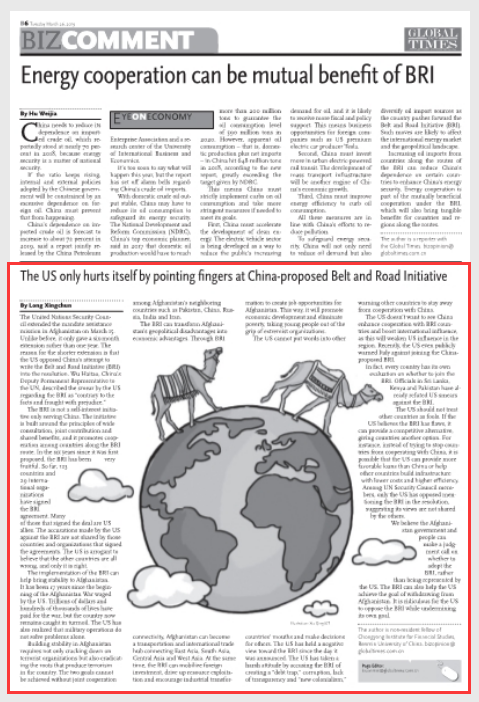Belt and Road
Your Present Location: PROGRAMS> Belt and RoadLong Xingchun: The US only hurts itself by pointing fingers at China-proposed BRI
By Long Xingchun Source: Global Times Published: 2019-3-25
The United Nations Security Council extended the mandate assistance mission in Afghanistan on March 15. Unlike before, it only gave a six-month extension rather than one year. The reason for the shorter extension is that the US opposed China's attempt to write the Belt and Road Initiative (BRI) into the resolution. Wu Haitao, China's Deputy Permanent Representative to the UN, described the smear by the US regarding the BRI as "contrary to the facts and fraught with prejudice."

The BRI is not a self-interest initiative only serving China. The initiative is built around the principles of wide consultation, joint contribution and shared benefits, and it promotes cooperation among countries along the BRI route. In the six years since it was first proposed, the BRI has been very fruitful. So far, 123 countries and 29 international organizations have signed the BRI agreement. Many of those that signed the deal are US allies. The accusations made by the US against the BRI are not shared by those countries and organizations that signed the agreements. The US is arrogant to believe that the other countries are all wrong, and only it is right.
The implementation of the BRI can help bring stability to Afghanistan. It has been 17 years since the beginning of the Afghanistan War waged by the US. Trillions of dollars and hundreds of thousands of lives have paid for the war, but the country now remains caught in turmoil. The US has also realized that military operations do not solve problems alone.
Building stability in Afghanistan requires not only cracking down on terrorist organizations but also eradicating the roots that produce terrorism in the country. The two goals cannot be achieved without joint cooperation among Afghanistan's neighboring countries such as Pakistan, China, Russia, India and Iran.
The BRI can transform Afghanistan's geopolitical disadvantages into economic advantages. Through BRI connectivity, Afghanistan can become a transportation and international trade hub connecting East Asia, South Asia, Central Asia and West Asia. At the same time, the BRI can mobilize foreign investment, drive up resource exploitation and encourage industrial transformation to create job opportunities for Afghanistan. This way, it will promote economic development and eliminate poverty, taking young people out of the grip of extremist organizations.
The US cannot put words into other countries' mouths and make decisions for others. The US has held a negative view toward the BRI since the day it was announced. The US has taken a harsh attitude by accusing the BRI of creating a "debt trap," corruption, lack of transparency and "new colonialism," warning other countries to stay away from cooperation with China.
The US doesn't want to see China enhance cooperation with BRI countries and boost international influence, as this will weaken US influence in the region. Recently, the US even publicly warned Italy against joining the China-proposed BRI.
In fact, every country has its own evaluation on whether to join the BRI. Officials in Sri Lanka, Kenya and Pakistan have already refuted US smears against the BRI.
The US should not treat other countries as fools. If the US believes the BRI has flaws, it can provide a competitive alternative, giving countries another option. For instance, instead of trying to stop countries from cooperating with China, it is possible that the US can provide more favorable loans than China or help other countries build infrastructure with lower costs and higher efficiency. Among UN Security Council members, only the US has opposed mentioning the BRI in the resolution, suggesting its views are not shared by the others.
We believe the Afghanistan government and people can make a judgment call on whether to adopt the BRI, rather than being represented by the US. The BRI can also help the US achieve the goal of withdrawing from Afghanistan. It is ridiculous for the US to oppose the BRI while undermining its own goal.
The author is visiting fellow of Chongyang Institute for Financial Studies, Renmin University of China.























































































 京公网安备 11010802037854号
京公网安备 11010802037854号





